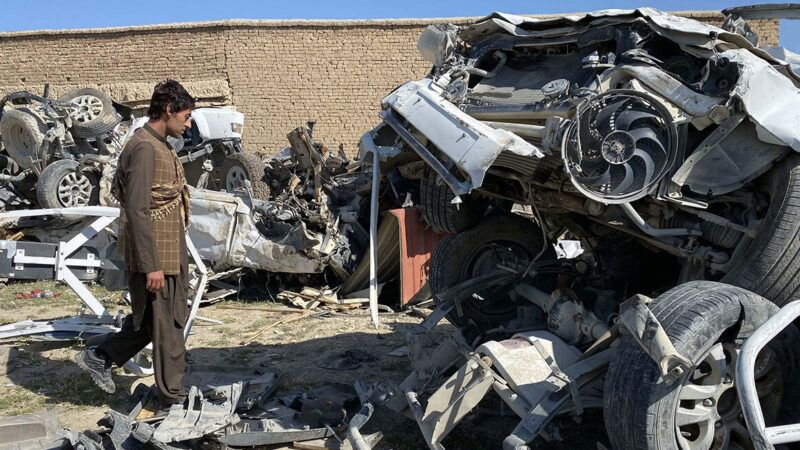America's Forever War Sputters Out
It is easy to be indifferent to a war if you are oblivious to its costs.

With troops finally scheduled to withdraw from Afghanistan after two decades of conflict, America's intervention there will go down in history as an accidental forever war. After the initial invasion, it was only peripherally part of the country's policy debates, rarely occupying the attention of Americans who did not have relatives involved in the fighting. While polls indicate broad public support for withdrawal, the end to years of bloody struggle approaches with little fanfare in the U.S.—and plenty of wreckage left behind.
"They destroyed our country, and now they are giving us their garbage," junk dealer Hajji Gul told the Associated Press in May as he surveyed equipment deliberately wrecked by departing American troops so it cannot be used by locals. "What are we to do with this?"
Also destined for the scrap heap: the Afghans who worked for years with Americans and are being left behind under the uncertain protection of a shaky U.S.-backed regime. "You will see the dead bodies in every street," interpreter Omid Mahmoodi predicted in an interview with USA Today. "They will slaughter us."
Americans nevertheless are ready for the war to end. An Economist/YouGov survey conducted in April found that 58 percent of Americans, including 61 percent of Americans in military households, support the withdrawal.
If a majority of Americans favor ending America's intervention in Afghanistan, why did it take so long?
"More than half of Americans (57 percent) do not follow any news and information about the U.S. involvement in Afghanistan," an A.P./NORC poll found in October 2020. Those who paid the least attention were the 18- to 29-year-olds who were most likely to fill the ranks of troops sent to the region.
That inattention had other consequences. Pollsters found that knowledge of American casualties raised support for ending the U.S. intervention, but Americans generally lacked that knowledge. It is easy to be indifferent to a war if you are oblivious to its costs.
Despite the current popularity of ending U.S. involvement in the country, the share of Americans who thought "the United States made a mistake sending troops to fight in Afghanistan in 2001" only briefly matched the share who did not think so—in 2014. After that, according to Gallup, agreement that the war was a mistake stalled around 43 percent, 10 points below disagreement with that statement.
Public indifference was exacerbated by deliberate deception. The administrations of Barack Obama, George W. Bush, and Donald Trump concealed the war's failure for years. "A confidential trove of government documents obtained by The Washington Post reveals that senior U.S. officials failed to tell the truth about the war in Afghanistan throughout the 18-year campaign, making rosy pronouncements they knew to be false and hiding unmistakable evidence the war had become unwinnable," the newspaper reported in December 2019.
That unpleasant truth was easier to conceal because the anti-war movement was reluctant to hold Democrats accountable. "The antiwar movement demobilized as Democrats, who had been motivated to participate by anti-Republican sentiments, withdrew from antiwar protests when the Democratic Party achieved electoral success, if not policy success in ending the wars in Iraq and Afghanistan," University of Michigan political scientist Michael T. Heaney and Indiana University sociologist Fabio Rojas noted in a 2011 study. "While the election of Barack Obama had been heralded as a victory for the antiwar movement, Obama's election, in fact, thwarted the ability of the movement to achieve critical mass."
Combine that partisan loyalty with the general lack of attention by voters, and there was nothing to deter a rotating cast of politicians and military officers from fiddling around the edges of the war like it was a game. They ignored its accumulating costs as they tried to extract victory from an impossible situation.
Trump ultimately lost patience and negotiated an end to U.S. intervention in Afghanistan—an agreement that President Joe Biden says he will honor. The inhabitants of that unfortunate country seem equally ready for an end to the accidental forever war, though they likely will be stuck with the butcher's bill for years to come.



Show Comments (52)